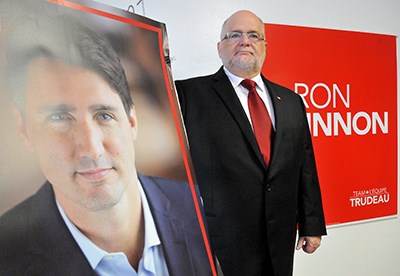RON MCKINNON
AGE: 64
OCCUPATION: Computer systems analyst, document management consultant
INFO: ronmckinnon.liberal.ca, Ron-McKinnon (Facebook), @RonMcKinnonLib, 604-475-8858, [email protected]
Ron McKinnon has big dreams for a post-Oct. 19 Canada. In them, under a majority Liberal government, there will be a stronger economy, more jobs, affordable childcare and more housing options, a better future for young people and better care for seniors.
And that's not all. McKinnon, who spent his career as a systems analyst and document management consultant, has long been interested in governance and parliamentary affairs (political gamesmanship, less so) and has developed an alternative to our first-past-the-post electoral system, which many feel provides results that don't accurately reflect voters' wishes.
McKinnon proposes a "ranked pairs" system (a detailed explanation can be found through a link on McKinnon's election site, ronmckinnon.liberal.ca) that would produce representatives who are clearly preferred by the majority of voters — not the "first-preference support of the largest minority."
Such a system would establish a fairer democratic process and create more robust voter engagement, McKinnon said, noting the Liberals have promised that, once elected, they would form an all-party committee to study alternatives to first-past-the-post.
"Their voices will be heard… and it makes this whole business of vote splitting go out the door," McKinnon said. "It makes smaller parties such as the Green Party, whose voice is important for us to have in our system, important. But our first-past-the-post system discourages multiple parties from being in the system and leads to dysfunction and discontent."
He said he has spoken with residents who feel disconnected from the electoral process and the government, and suggests there's a better way forward under Justin Trudeau's Liberals.
"It boils down to the economy — many people are concerned about… keeping their job and being able to make the mortgage, but there's also a concern with the affordability of housing," particularly as Metro Vancouver expects to absorb a million more people by 2040.
The Liberals' platform addresses those concerns and aims to stimulate the economy by investing in affordable housing for a range of income levels and for seniors, and investing in projects ranging from public transit to clean energy infrastructure, McKinnon said, adding job creation strategies are another key element.
"I've talked to a lot of people whose kids can't find jobs. They get all kinds of training but they can't get a job," said McKinnon, who also serves as director and vice-president of the Evergreen Cultural Society. The Liberals would invest $1.3 billion over three years to re-invigorate the country's youth employment strategy, invest in co-op programs, ease restrictions on Employment Insurance qualifications and provide businesses with incentives to hire young people.
And while critics have decried the Liberals' plans to run deficits for the first three years, McKinnon said it's a sound financial strategy that takes advantage of low interest rates to stimulate the economy and improve the lives of Canadians for the long haul.
"Improving the economy, by stimulating it and making more job opportunities, will help this community… and help Canada across the board."



